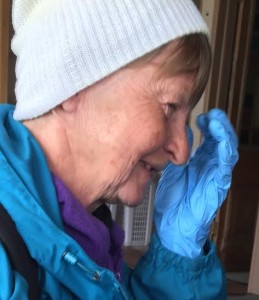Flap Your Wings (and maybe stomp your feet a little)! My Editorial on Education
(and btw, I feel like I’ve just been endorsed by John Oliver): https://www.youtube.com/watch?v=J6lyURyVz7k
I have felt overwhelmed countless times in my life. Opening a junk drawer can ruin my day. I would rather show up for class sick than create a lesson plan for a substitute teacher. The thought of writing a whole book nearly paralyzed me. I could not go into a library or bookstore without coming out depressed. What could I write that hadn’t already been written? But I had made a promise.
“Someday I’ll write a book about this year,” I told the first group of 7th graders I ever taught. I didn’t know how or when or what type of book it would be, but every student wanted to be in my book, and I still have the roster with their actual names and the names they wanted me to call them whenever I wrote it.
Although I could not fit over 100 students into my novel and felt a need to create my own names for the amalgamated students I chose to represent, I fulfilled my promise seven years later and donated over $1,200.00 in sale proceeds to a graduating student in my community. I also found my real-world model for the troublesome character “Bernicia” and learned something wonderful.
“Miss?” is fictionalized for obvious reasons, but the realism of Maggie’s first year teaching experience is apparent to all teachers I’ve spoken with about the story. It certainly helped that I kept a daily journal my first year of teaching.
I discovered quickly that they just don’t make schools like they used to.
Today’s public schools are becoming battlegrounds, figuratively and literally, but they don’t need to be that way. Daily, teachers post their frustrations on social media, many who then are written up by their superiors for expressing their feelings. Routinely, citizens become a bit more outraged by the tide of school violence, the recent surge against which we seem to have no power. Companies are developing bullet-proof blankets for students; many suggest arming teachers.
Teacher complaints are well-founded. Much like the companies that will get rich from blanket sales to schools, others are flourishing from quick-fix programs school administrators are eager to employ, and classrooms around the nation are becoming marketplaces. “But wait! There’s more!” . . . and more, and more for teachers to work into their full curricula. They feel besieged. More “professional development” for teachers—on the latest programs—equates to less time doing what they know how to do best: Teach.
“So what’s the answer, Miss?”
Many of my friends, astounded by the picture I’ve painted, have asked me this question after reading my novel. There is no single—no easy answer, no quick-fix, and I do not pretend to have the solution.
Struggling schools face a plethora of challenges daily, and three of the most debilitating I’ve experienced include corrosive work environments, over-testing of students and lack of effective student discipline. Of the three, lack of discipline can be the greatest detractor to success, though potentially it is the easiest problem to remedy.
Ideas on polishing potentially “corrosive work environments”:
Are all teachers great at what they do? Of course not. Neither are all administrators, all CEOs, all parents, all community and government leaders, all students. Nevertheless, the current environment in many districts is suffocating and good teachers are reconsidering their profession. Many factors combine to create harsh work environments in schools—a revolving door of initiatives, lack of communication and trust between peers and supervisors, and lack of community support—and I won’t even address the issue of low pay in many of our most difficult towns.
Teachers are fed up with having to implement the latest program-du-jour with inadequate training or preparation time, and veteran teachers see though the smoke and mirrors of purportedly “new” programs.
“Just wait five years and you’ll see the same things come back,” one retiring elementary school teacher recently told me. “They’ll just give it a new name.” After 45 years of teaching, she should know.
The same is true for instructional standards set for each subject by state departments of education. Weeks have been wasted on reconfiguring curricula to the latest standards that have been tweaked to sound more reasonable, more doable, while the bottom-line expectations remain the same: students must be able to read and write and do ‘rithmetic at more advanced levels each year. Rewording requirements so we have four rather than six for Language Arts standards is a wasteful, frivolous exercise. Teachers know this, and students have never felt the need to fret over the boring banners outlining all they are expected to learn in each classroom.
I recommend that leaders in school districts across the nation step back and take a deep breath the next time they are approached by any agency offering a new program, especially from commercial entities, and consider if the potential benefits are worth the time needed to invest in adequately implementing the program. Consider as well that even if a program has demonstrated success in a small town in Maine, it doesn’t necessarily mean it will deliver the same results in a rural Texas town.
Let me take my recommendation one step further and suggest that school leaders look within their own pool of teachers and staff members before paying outsiders to deliver training and “professional development.” I lost track of teacher hours wasted during my years in public education, hours during which my peers and I felt belittled or treated as if we knew nothing about the students in our care—by people who knew nothing about us nor about our students. We preach differentiation for students, so why not extend the concept to teacher training?
More often than not we sat through information we already knew or could have presented ourselves, with no opportunity to “test out.” A potential stipend or continuing education credits for someone already employed in a school district would do much to improve morale and would cost significantly less than paying a program-pushing agency. If we truly want to develop as professional educators, we should explore every opportunity to develop from within.
School administrators who are ignorant of their internal assets will also undoubtedly struggle with organizational communication, increasing environmental toxicity and destroying morale.
For years I taught my students how to use figurative language elements to give readers a clear picture of what they are trying to express. “Unclear communication is like an outdated road map; it can leave you lost and confused,” I’d say, and some of them even appreciated my simile. The ability to communicate effectively is critical for building effective relationships, and effective relationships inherently require trust between parties. Without an atmosphere of open and honest dialogue in an organization, it is nearly impossible to develop trust between members of that organization.
During my first back-to-school meeting with district staff and faculty in my new school, my boss, who knew about my West Point education and Army background, encouraged me to lead a group activity. That was the start of my involvement with the district instructional leadership team. For two and a half years in that school I collaborated with my peers and those above me on topics ranging from curriculum design to school spirit. I sent weekly emails to all staff members with topic recaps, suggestions and reminders. My peers knew they could share concerns and questions with me and that I would represent them the best I could.
Turning around a corrosive atmosphere in which members believe information is being withheld can be as simple as sending out routine status updates, minimally once per week. To be truly effective as a leader, those you lead must believe that you value them as individuals—a belief worth more than any price tag—and by keeping them “in the loop,” you demonstrate that respect.
Sure, there will be times when closed-door sessions take place, but leaders must still find ways to share even the most difficult conversations in a way that keeps the best interests of the organization in mind. Secrets will always breed contempt and destroy trust among those who feel left out, and we all have witnessed or experienced the wildfire effects of rumors.
What kind of investment is necessary to improve communication within a school district? Time. Even 15 minutes each week dedicated to sending out an update and perhaps even highlighting a success, however small, could start transforming the morale in an organization where employees have felt in-the-dark for too long.
Shawn Achor, author of The Happiness Advantage, demonstrates several examples of organizational leaders who have deflated the mood of otherwise buoyant employees by communicating in a way that inadvertently failed to emphasize anything positive. He reminds us that “Just as important as what you say to employees is how you say it.”1 The premise of The Happiness Advantage is that success follows happiness, not the other way around; it is a book worthy of designing a professional development session around.
Involve local communities to improve the environment in your school district!
Those who are able to participate in community outreach programs should do so. Outreach is vital, especially in school districts with limited funds, and the most creative school leaders find ways to expose students to the world outside their classrooms before launching them into that world with a handshake and a piece of paper.
Local businesses were delighted to open their doors to my students for field trips and writing opportunities and the local newspaper welcomed articles and pictures of those free fieldtrips.
Leaders must be available to serve and support others in their community in order to build trust and unity of vision, and community members need to get to know our students if we hope to have them share our vision of success as well. Exploring opportunities for visits, internships and community service would cost only an investment of time—and the rewards would be invaluable.
Leaders and teachers owe it to their students to develop relationships with community members in an effort to realize a shared vision of growth and success for all members of their district. Ultimately, schools in which community involvement is valued will be more successful, and a school’s success, in turn, will improve the whole community.
Assess, yes, but in moderation.
A school district that fails to assess its students is like a proctologist whose magic wand explores the wrong end; both will lack the vital information necessary to improve the lives of those in their care. Now more than ever our students must understand that their public education is designed to prepare them for a workforce increasingly geared toward employing those with education beyond high school. Regardless of the type of further education—whether it be in a degree program or in technical training—assessments are an academic reality. The challenge, then, is to ensure there is an acceptable balance between time spent assessing and time spent teaching and learning because our students—whether or not they are English Language Learners—will not perform well when assessed without sufficient time to learn and will rebel when they believe they are being used as guinea pigs.
Students and teacher alike know their schools will try anything to improve yearly performance on high-stakes testing and that “anything” generally results in a multitude of assessments throughout the year. These assessments often have no consequences for the student and reduce actual teaching opportunities for teachers.
What follows is an essay I wrote encouraging parents to rally together to opt out of the latest high stakes test designed with no other purpose than to keep a corporation’s pockets full. It clearly outlines my frustration with the current environment of over-testing in our public schools.
Stop Outsourcing our Children
I’m not proud of what I’m about to share with you, but here goes. Many of you know me as “Leadville Laurel,” one of your local authors. I have taught, and continue to teach, English to many of your children. So when I started hearing about the new test—PARCC—which replaces CSAP this year, I started asking questions. My questions were answered with grumbles. “Take the 5th grade practice test,” someone suggested, “and see for yourself.”
Never one to walk away from a respectable challenge, and feeling quite confident that I am smarter than most 5th graders, I visited the web site and started the 5th grade English test. An hour later and with shaking hands (pretty sure my blood pressure was up several points), I got my score: 30/40, a solid 75%, perfectly “average” for a 5th grader. Granted, I didn’t go back to check my answers, so I might have reconsidered some of my responses. And I suppose I might have earned an extra four points for two essays I wrote, one having to compile and compare information from three separate essays and one having to rewrite a narrative from a different character’s point-of-view, but those portions would have to be evaluated by a faceless person and scored. When? Who knows!
Developed by Pearson, the same company that earns its fortunes through the sale of textbooks to our schools, the test—in addition to being stressful—is vague, complicated, and confusing. So why am I sharing this with you? Why am I confessing that despite my MA in English, I did not even score in the “Good” range on a 5th grade test? Because I’m asking you to do what I did. Pick one of the practice tests and see how you do. Then scream out loud. Then, if you have a grade 3-10 student, hug them. Then write a letter to their school saying, “I am opting my child out of taking the PARCC test this year.”
Schools across the country are already protesting the increasing insanity of the testing we’ve imposed on our children since the inception of NCLB. Proponents of these springtime tests (with results coming months later, never in time to alter instruction) say that testing is a part of life, and use the SAT college exam as a reason to pre-pre-pre-test. I say hogwash. If teachers were allowed to teach their students core material (teach, not test, because there is no instruction or learning happening during a test) like my teachers could back in the olden days, their students would do just fine on the SAT. Or not. Not everyone needs to attend a four-year college anymore.
Most parents won’t take my suggestion. Most will continue to grumble, but will not want to “rock the boat.” And without a dissenting majority, our schools will continue to buy the latest “testing success” materials and our children will learn less and less each year. And perhaps our parents don’t feel qualified to be vocal about what’s happening in our classrooms, so here’s my suggestion to those of you who don’t like what’s happening, but are unsure of what to suggest as an alternative to having your child sit through days of meaningless assessments.
Our school district is still in the process of implementing Expeditionary Learning. Why not use testing week(s) to have our students complete a project that is both meaningful and manageable to evaluate internally using the core standards at each grade level for English, math, and science. At least have that as an “opt out option” rather than sending students wherever administrators decide to send those who are bold enough to “just say no” this year.
Here’s the thing. Our teachers are “highly qualified” in their subject areas and in evaluation strategies. They know what their students should learn and where they are weak. They’ve endured countless hours of professional development on the same topics every year (from money-making companies who package old ideas with new names), and they’ve been forced to outsource the evaluation of their students to corporations that don’t give two hoots about them or their classrooms. Why?
We can’t afford to be complacent anymore. Whether we have children in the public school system or not, we pay for the schools in our district, and all of our graduates will impact the communities in which they live. We all should feel empowered to demand more: More learning, less testing. Opt out, Leadville, and work with your elected officials and school board members to take back the education and evaluation of our students from careless corporations.
~~~~~
Just as professional runners should not train at race-day pace every day for fear of injury or burnout, students should not be assessed so frequently that they, too, experience burnout. The student, like the runner, wants to perform well, but also knows that without the proper amount of time to absorb new learning, s/he will struggle. By evaluating and selecting the most efficient tools for assessing students and employing them judiciously, we can expect that students will do their best when asked. Regardless of the results, effort and improvement—however much—should be recognized and applauded.
Socrates is credited with stating that “the unexamined life is not worth living.” While perhaps an extreme viewpoint, it nevertheless is a strong suggestion that examination, assessment, thoughtful reflection on what works, what doesn’t, and why, can bring about growth. School leaders and teachers, much like that proctologist I mentioned earlier, must use their examination tools wisely to benefit those they serve.
The Ultimate Challenge: Discipline
How do we solve the problem of discipline in our schools? We don’t. Every year teachers will have to learn how best to handle new challenges brought to their classrooms with unruly and often emotionally disturbed students, but if teachers and school leaders present a united front, then not everyone has to become the victim when little Johnny and Janie act up.
While many in academia tout the advantages of using technology in classrooms to appeal to their students and keep them engaged, in a December 2014 article in The Atlantic by Alexandra Ossola, psychology professor Daniel Willingham mentions a study in which the majority of teachers surveyed believed that technology posed a negative influence on their students. The professor’s concern is that “kids can pay attention but they just don’t want to. They have the expectation that everything should always be interesting.”
As an English teacher, I would tell the professor that the word “interesting” is as meaningless as the word “nice” when describing something, but I also know what he means. Students today do not tolerate boredom well, and why should they? We live in a world where the power to learn anything from soap-making to proctology rests in our pocket. Still, many a lesson has gone unlearned by students who have mastered the art of pocket-texting friends while pretending to listen to their teacher, and who believe their multi-tasking is not interfering with their learning. Studies have shown what we teachers already know: our students are wrong.
We’ve seen how kids of all ability levels turn into troublemakers when they are bored in classrooms. One suggestion, then, is to organize our classrooms in a way that helps teachers minimize the opportunity for boredom. Let’s let students with similar academic abilities learn together. Let’s finally answer the question of how teachers will differentiate for all levels of learning by differentiating our classrooms. This is not a politically correct solution, but haven’t we all had enough of teaching to the average—or even lowest level learner in a classroom designed with only political correctness in mind?
Another suggestion is to stop the practice of advancing students who are not ready for the next level of education. Currently, community colleges are faced with enrolling students with high school diplomas who cannot test into the basic college classes. They offer remedial courses for no college credit, sometimes concurrently with first year classes, and the burden on unprepared students is tremendous. College professors are flummoxed by the lack of preparedness for higher-level learning.
Although we’d like to put the blame on the student for not being prepared, how can we if we’ve never expected them to demonstrate proficiency in their K-12 years? As a minimum, students advancing to high school should demonstrate they have mastered the fundamentals of reading, writing, and mathematics. Tenth grade English teachers should not have to teach the proper use of a period and high school principals should not find it necessary to give up their 28-minute lunch break to tutor students on multiplication tables.
Students who are passed along through the K-12 system should not show up to class each day knowing that if they disrupt their peers or tell their teacher to piss off, or worse, they will be sent home for the day, a consequence students consider a bonus. Too many teachers’ hands are tied by threats of lawsuits and administrators who favor the notion of nurturing over discipline as if the two were mutually exclusive. Discipline, something that winning teams and organizations know is necessary for success, has somehow earned a bad rap in education circles and students know it.
So let’s take back control of our school environments, my final suggestion. School leaders, do the right thing. Do the unpopular thing. Review your book of rules and student conduct, revise it if necessary, and then—most importantly—enforce the expectations you’ve established. If you don’t do it, and do it consistently and across the board, then don’t expect your students to comply. Expect them instead to decide which rules, if any, they’ll follow, and then expect your staff and faculty to waste valuable time on disciplinary issues that rob them of their ability to teach effectively. Once you regain control, have the backbone necessary to hold students responsible for demonstrating their readiness at each level of education before advancing them to the next.
What more can school leaders and community members do to improve their schools?
Whether your school district is small or large, affluent or struggling, it can always improve with increased effort and attention. I believe that what works in a disadvantaged town also can help in areas more well-off. This is what I am asking you to do in your community whether you teach or have school-aged children or not. Strong schools benefit the entire community, so share these suggestions with everyone you know:
- Encourage community members to visit your schools. Have them call ahead to find out about sign-in and security procedures. Let them visit classrooms, and if they have time and talents to offer—
- Ask them to volunteer to help. Could they tutor a subject? Make copies? Bring supplies to the art teacher? Listen to a child read? Work with math flashcards? Do a presentation on an area of expertise? Research ways to challenge advanced students? The possibilities in this area are limited only by what community members are willing to do. If you know someone who has their own business—
- Find out how their local businesses can interact with your schools. With limited funding, schools are often unable to provide field trips for students. Local business can provide a solution by opening their doors to student groups. Regardless of the subject matter, teachers will find a way to tie in an academic standard, be it writing, research, calculation, art, history, and by exposing students to local businesses, their understanding of the practical applications of what they are learning in the classroom becomes more meaningful. With a bit of planning, business owners will be able to answer the question, “But how will I use this in the future?” And if business owners are open to the idea—
- Find out if there are opportunities for students to do internships. Paid or not, internships provide students with goals beyond their K-12 education. Speaking of internships—
- Consider and suggest ways students might intern within the school district. Could the district’s website be updated routinely? Might teachers need help researching future lessons? Are there custodial projects that could be completed with extra hands? Would the local news outlets like to receive routine articles highlighting school activities? There are many ways in which student involvement would enhance both their skills and their communities.
- Run for a school board position. You do not need to be a parent of a school-age child, but you do need to care about the routine and future decisions of the school leadership. If you are not inclined to become a board member, you may still attend board meetings. Find out what decisions are being made about your schools and know the people who are making the decisions—they are elected to make smart ones. If you are not happy with the way things are handled in schools in your community—
- Elect people who have the best interests of students in mind. This goes not only for school board members but for other local officials as well. As a minimum—
- Teachers, support your peers in whatever ways you can. Let them know they are not alone and that you understand their challenges. By becoming involved outside of your classroom, you can help to improve the environment in your schools. Good teachers work long hours for meager pay because they believe what they are doing will help their students, and ultimate the future of their communities. Write a note. Make time to visit another classroom. Meet for coffee. Lend an ear.
On the last page of Achor’s The Happiness Advantage we are reminded of the story of the hurricane attributed to a butterfly flapping its wings. “And each tiny move toward a more positive mindset can send ripples of positivity through our organizations, our families, and our communities. . . . the ripple effect is the perfect example of how there are no real discernible limits to our influence and our power (210).”3 Recognizing that I sound like Pollyanna, I still will ask each of you to believe you can bring about significant change by exercising your wings.
“Bernicia” ended up earning her diploma through a GED program after dropping out to raise the child she had as a young teen. She has a good job and a great relationship with the father of her child. She told me that my belief in her and in her poetry inspired a belief in herself she never had before. Every teacher and every community member has the potential to change a child’s world view.
Public schools will never be what they used to be when I was a kid, and in many ways, that is a good thing, but school should not feel like battlegrounds. There should be no “us against them” in places that prepare our students to become productive members of the communities in which they will live. We are all in this together. Educators are smart, tools are plentiful, and with the right team, any school system can improve. Together we must work toward improving the conditions of all who pass through and work in our academic establishments. Get involved and get your community involved. Offer what you can. Flap your wings. Do not leave the future to someone else.
1 Achor, Shawn. The Happiness Advantage. New York: Crown Business. 2010. Page 59.
2 Ossola, Alexandra. “Why Kids Won’t Quit Technology.” December 10 2014, 11:50 AM ET.
http://www.theatlantic.com/education/archive/2014/12/why-kids-wont-quit-tech/383575/ Web. retrieved 01/02/15
3 Achor, 210.
 with the ceiling over the shower, I worked my way around the room until an even coat of paint covered the surface and me. Ever since our contractor upgraded the bathroom, painting only around the light fixtures he moved, the patchy paint job has bugged me. No more!
with the ceiling over the shower, I worked my way around the room until an even coat of paint covered the surface and me. Ever since our contractor upgraded the bathroom, painting only around the light fixtures he moved, the patchy paint job has bugged me. No more!




















